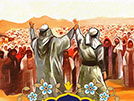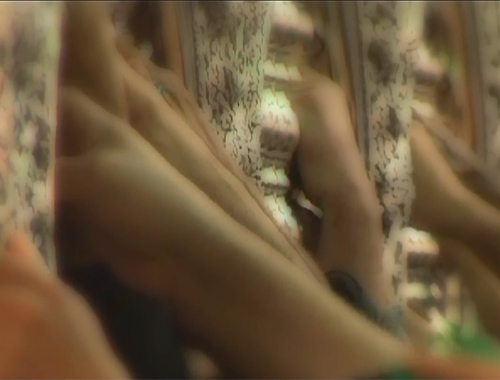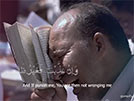Qur’anic verses denounce lying
- Details
- Hits: 3245
Qur’anic verses denounce lying
Allah the Almighty says in Surah an-Nahl, verse 105:
“Only they forge the lie who do not believe in Allah’s communications, and these are the liars.”
And in Surah az-Zumar it is mentioned:
“Surely Allah does not guide him aright who is a liar, ungrateful.”
(Surah az-Zumar 39:3)
It can be understood from the verses of the Qur’an that a liar calls for divine curse and invites the anger of Allah (S.w.T.).
For example:
“... and pray for the curse of Allah on the liars.”
(Surah Ä€li- ImrÄn 3:61)
And also:
“... the curse of Allah be on him if he is one of the liars.”
(Surah an-NÅ«r 24:8)
A large number of Qur’anic verses and traditions condemn the sin of lying and describe its evil consequences. The late Haji NÅ«ri has collected these verses and traditions and classified them into forty points for easy recalling and reference. We shall quote them for the benefit of our readers.
1. Lying is transgression
Allah (S.w.T.) says in Surah al-Baqarah:
“...there shall be no intercourse nor transgression nor quarreling amongst one another (during Hajj).”
(Surah al-Baqarah 2:197)
The word “transgression” in this ayat refers to falsehood or lying.
Again in Surah al-HujurÄt it is mentioned:
“O you who believe! If an evil-doer comes to you with a report, look carefully into it, lest you harm a people in ignorance, then be sorry for what you have done.”
(Surah al-HujurÄt 49:6)
This ayat was revealed for Walid, who is mentioned as an “evil-doer”; i.e. a liar.
2. Meaning of the term “false words”
Alongwith the prohibition of worshipping idols it is ordered by Allah (S.w.T.) to abstain from falsehood.
“...therefore avoid the uncleanness of the idols and avoid false words.”
(Surah Hajj 22:30)
In this verse ‘false words’ mean lying.
3. The liar is not a believer
One of the verses quoted above demonstrates that a liar is not a believer and one who is a believer never speaks a lie. The verse pronounces:
“Only they forge the lie who do not believe in the signs of Allah.”
(Surah an-Nahl 16:l05)
For it is clear that one who disbelieves in the divine communications cannot be a Mu’min (believer).
4. Lying is an evil and a sin
Traditions have mentioned lying as a sin and an evil. For example, Hazrat Muhammad al-Baqir (a.s.) says:
“Falsehood is absolutely an evil and a sin.”
5. The Liar is accursed
The liar is eligible for divine curse and Allah (S.w.T.) causes His retribution to descend upon him.”
For example:
“...the curse of Allah be on him if he is one of the liars.”
(Surah an-NÅ«r 24:8)
6. The blackened face of the liar
The Holy Prophet (S) says:
“Beware of falsehood! Because falsehood blackens the face.”
(Mustadrak ul-Wasa’il)
An interesting incident is found in the book, Habibus Sayr:
Sultan Husain Mirza, the king of Khorasan and ZÄblistan, sent one of his envoys to Sultan YaqÅ«b Mirza, the king of AzerbaijÄn and Iraq. The envoy carried with him books and other gifts. The Sultan had ordered the inclusion of the book Kulliyat al-Jami in the set of books. It was a very popular book in those days. AmÄ«r Husain AbÄ«ravi, the envoy, in his haste packed the book FutÅ«hat al-Makki instead of Kulliyat al-Jami. On reaching Iraq, he found a hospitable host in the ruler of Iraq. He was asked, “You must have been bored during this long journey?”
The envoy replied, “Not at all! The Sultan has sent for you Kulliyat al-Jami. So whenever we halted, I read some portions of it and passed my time.”
Sultan Yaqūb was eager to see the book. But, when he ordered for it, it was not found to the embarrassment of the envoy.
The king demanded, “Aren’t you ashamed to utter such a lie?”
The envoy says, “I left the court ashamed and returned home without a reply to my Sultan’s letter. I did not even halt or rest during the journey to Khorasan. I felt death would have been better for me, rather than uttering such a lie.”
7. Sin of lying is worse than drinking wine
Imam Muhammad al-Baqir (a.s.) says:
“Certainly Allah has created the lock for every evil and the key to all these locks is drinking wine. But lying is worse than drinking.”
(UsÅ«l al-KÄfi)
Wine disables reason and sense, but lying kills the reason. It makes one so insensate that he becomes ready to commit any kind of satanic act. An alcoholic when under the influence of alcohol is not in his proper senses, and thus it is not possible for him to act with cunningness and treachery. But a liar can cause untold mischief in the society through his cunningness; much more than a drunkard can.
8. The foul-smelling mouth of the liar
It is recorded in a tradition that on the Day of Judgement the mouth of a liar will give an awful smell.
9. The Angels abhor the liars
The smell of a liar’s mouth would be so disgusting that even the Angels will not go near him. They will keep away from the liars. This is not only for the Day of Judgement. Even in this world, the Angels can smell the foul odour from the mouths of the liars. In a prophetic tradition it is said,
“When a believer utters a lie, such a bad smell emanates from his mouth that even the Angels move away.”
(Mustadrak ul-Wasa’il)
10. Lying is disbelief (kufr)
The Almighty Allah curses the liars, as is evident from the verse of Mubahala (3:61) and the verse of ‘LÄm’ (24:8).
A mention about this has been made earlier.
11. The stench from the liar’s mouth reaches the skies.
12. It is also recorded that the Angels of the sky curse the liars.
13. Falsehood spoils faith.
Imam Muhammad al-Baqir (a.s.) says:
“Lying destroys Faith”
(al-KÄfi)
14. Falsehood deprives the liar from the taste of faith.
Imam ‘Ali (a.s.) says:
“Every believer is deprived from the taste of faith till he gives up lying seriously and also in jest.”
(al-KÄfi)
15. According to traditional reports, lying causes animosity and hatred between people.
16. The vice of lying questions the character of the liar.
A tradition of the Prophet (S) says:
“The least forbearing is the one who is a liar.”
(Mustadrak ul-Wasa’il)
17. The traditions from Ma’sÅ«mÄ«n (a.s.) inform us that all the evils are locked in a room and the key to that room is lying.
18. Lying is a sin and a transgression.
The Holy Prophet (S) is reported to have said.
“Avoid speaking falsehood, because it is a kind of evil and transgression. And both of them belong to Hell.” (They make one eligible for Hell).
(Mustadrak ul-Wasa’il)
19. According to other reports, seventy thousand Angels curse the liar.
20. Lying is a sign of a hypocrite.
The following tradition of the Holy Prophet (S) is present in the book of Mustadrak ul-Wasa’il:
“The Three signs of a hypocrite are:
Lying, betraying trust and going back on his word (Not fulfilling a promise).”
21. The Islamic Shari’a does not pay heed to a liar’s advice.
In this regard the Holy Prophet (S) remarked:
“The advice of a liar has no value.”
(Mustadrak ul-Wasa’il)
22. Falsehood is the worst of the psychological ailments.
Amir ul-Mu’minÄ«n ‘Ali (a.s.) says:
“The disease of lying is the most dreadful of the (psychological) diseases.”
(Mustadrak ul-Wasa’il)
23. Lying is an embellishment of Satan’s hands.
A narration of the Prophet (S) is as follows:
“Certainly, IblÄ«s applies antimony (surma), wears a ring and uses snuff. His antimony is laziness and dozing, the ring of his finger is lying and his snuff is pride and arrogance.”
24. The worst earning of a man is falsehood.
The Holy Prophet (S) says:
“ The worst of the profit is from the trade called ‘lying’.”
(Wasa’il ul-Shia)
Yes! It is a fact that by lying, a person is liable for punishment more than for any other sin.
25. A man came to the Holy Prophet (S) and asked,
“Which action makes the highest number of people the inmates of Hell?”
The Holy Prophet (S) replied,
“Lying. When a believer speaks a lie, he becomes prone to commit every other sin; and when this happens, he commits kufr (disbelief) which then makes him enter Hell.”
(Mustadrak ul-Wasa’il)
26. Lying causes forgetfulness
Imam Ja’far as-Sadiq (a.s.) is reported to have said,
“One of the divine punishments for too much lying is that Allah makes the liar afflicted with forgetfulness.”
(Wasa’il ul-Shia)
Thus a man speaks a lie and then forgets his lie. Consequently people come to know that he has spoken a lie and his falsity is exposed to the people.
Now to save his skin he speaks more lies and is insulted further because his forgetfulness does not enable him to hide his false statements.
27. Falsehood is one of the doors of hypocrisy.
28. Terrible punishment for the liars
A liar is inflicted with several kinds of punishments. Aqa Rawandi has quoted a lengthy tradition from the Holy Prophet (S) in his book DawÄt. The Prophet (S) while describing the spectacle of Miraj (Ascension) said
“I saw a man, who lay flat on his back while an angel mounted his head. The angel who was standing upon the head had a pointed iron rod. He repeatedly injured the sleeping person. The face of the victim was shattered upto the neck. But when the rod was lifted the head returned to its original form. Again the rod was hit on the face and the man suffered the same retribution.”
The Holy Prophet (S) says that he inquired,
“Why is this man punished?”
He was told, “This is a man who left his home in the morning and uttered a lie that caused harm to the people. So he shall be punished in this manner (after death) till the Day of QiyÄma.”
30. The liar is deprived of SalÄt al-Shab
The liar is deprived of SalÄt al-Shab and in this way he is also deprived of the benefits that accrue from SalÄt al-Shab and one of these benefits is the increase in sustenance. Sharifi narrates from Imam Ja’far as-Sadiq (a.s.) that he said,
“Doubtlessly, when a man speaks a lie, he is not able to get the opportunity of (performing) SalÄt al-Shab. And when he doesn’t get this opportunity (to perform SalÄt al-Shab) he does not get an increase in his sustenance.
31. Falsehood deprives the liar from true guidance and causes him to deviate.
The Qur’an says:
“And Allah does not guide the unjust people.”
(Sura al-Jumu’a’ 62:5)
32. Politeness and civility are removed from the one who lies.
Hazrat Isa Ibn Maryam is reported to have said,
“Civility abandons the one who is a frequent liar.”
(al-KÄfi)
Then no one is attracted towards him and no one finds any emotional attachment with him.
33. Falsehood is the most outrageous kind of evil and an abomination.
34. We have proved Falsehood to be a Greater sin.
35. Lying is poles apart from belief.
In fact a tradition from the Holy Prophet (S) says:
“Falsehood is inversely proportional to belief.”
That is; when falsehood increases, belief decreases.
36. The greatest sinner is the one who has lied.
The Prophet of Allah (S) said:
“The greatest of the sins is talkativeness and falsehood.”
(Mustadrak ul-Wasa’il)
37. The liar is doomed because of the lies that he utters.
The Messenger of Allah (S) says:
“Avoid falsehood. For it may appear to be a way of salvation, whereas in reality it leads to destruction.”
(Mustadrak ul-Wasa’il)
38. The liar does not deserve friendship and brotherhood.
The Chief of the believers, ‘Ali (a.s.) says:
“Every Muslim is supposed to avoid friendship and brotherhood with a compulsive liar. Because one who befriends a liar is himself considered a liar. Even if he speaks the truth, he is not trusted.”
(Wasa’il ul-Shia)
39. The liar is kept away from truth and reality.
“…surely Allah does not guide him aright who is a liar, ungrateful.”
(Surah az-Zumar 39:3)
“...Surely Allah does not guide him who is extravagant, a liar.”
(Surah GhÄfir, 40:34)
40. Inhuman form of the liar in Barzakh
The liar has a human form only in this world. In Barzakh he does not retain the human form. While describing the scenes of Miraj, the Holy Prophet (S) told Janabe Fatemah Zahra (S):
“On the night of Miraj I saw a woman whose head resembled a pig and her body was like that of a donkey. It was because she spread discord and told lies.”
(UyÅ«n al-AkhbÄr ar-RiÄa)











